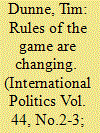| Srl | Item |
| 1 |
ID:
152936


|
|
|
|
|
| Summary/Abstract |
Although it seemed that the year 2012 was to be a pivotal moment for the EU in terms of positioning itself as a global supporter and defender of human rights, the Union continues to find it challenging to foster substantial ideational human rights change in ASEAN, despite cooperation growing on a practical level. Drawing on diffusion theory and with a focus on EU-ASEAN relations, this article examines the EU’s capacity to promote human rights to ASEAN and argues that whilst there is awareness within the EU of the shortcomings and challenges of EU external action concerning human rights support, how the EU diffuses human rights norms remains a challenge for the Union. This is primarily due to the fact that EU norm exportation takes place in the context of omnidirectional ideational flows which do not always facilitate the EU’s agenda or provide the intended outcomes of EU policy.
|
|
|
|
|
|
|
|
|
|
|
|
|
|
|
|
| 2 |
ID:
095378


|
|
|
|
|
| Publication |
2010.
|
| Summary/Abstract |
Does membership in Intergovernmental Organizations (IGOs) affect states' human rights behavior? One might expect IGOs with a specific human rights mandate, like the International Labour Organization or the Council of Europe, to have a positive effect on the human rights practices of their member states. But what about other sorts of IGOs, particularly those with no direct connection to human rights issues? This study employs cross-national data on abuses of "physical integrity rights" for 137 countries over the period 1982-2000 to test the hypothesis that IGOs can promote the diffusion of human rights norms by providing venues for interstate socialization. Recent empirical work on IGOs has suggested that this sort of socialization effect can play an important role in promoting democracy and can also lead to a more general convergence among states' interests. The results presented here suggest that IGOs can have a surprisingly powerful influence on states' human rights practices as a result of this process.
|
|
|
|
|
|
|
|
|
|
|
|
|
|
|
|
| 3 |
ID:
163318


|
|
|
|
|
| Summary/Abstract |
Since the 1980s, Japan’s war memory has strained its relations with South Korea and China, to a less degree, the USA. Two of the thorniest issues are the comfort women and the US atomic bombing of Japan. Before the Obama administration announced its policy pivot to Asia in 2011, both Japanese and American leaders were reluctant to make amends for the past acts of their countries. However, in 2015, the Japanese conservative Prime Minister Abe reached an agreement with South Korea that “finally and irreversibly” resolved the comfort women issue, thus achieving a historic reconciliation between the two countries. In 2016, then President Obama visited Hiroshima to commemorate the atomic bomb victims. Then, in December 2016, the comfort women issue resurfaced in Japan and South Korea relations, indicating a failure of the reconciliation. Why did the USA change its policy on historical issues involving Japan? Why did Abe and the South Korean President Park Geun-hye settle the comfort women issue? Why did Obama visit Hiroshima? Why did the reconciliation fail? In this article, I propose a rational choice theory to answer these questions. Applying the proposed theory and relying on available evidence, I argue that the settlement of the comfort women issue and Obama’s visit to Hiroshima are important components of Obama’s pivot to Asia to balance China’s rise. The reconciliation failed mainly because it did not resolve the historical justice issue promoted by the human rights norms. I discuss some implications for reconciliation in Northeast Asia.
|
|
|
|
|
|
|
|
|
|
|
|
|
|
|
|
| 4 |
ID:
077888


|
|
|
|
|
| Publication |
2007.
|
| Summary/Abstract |
Is there a crisis of legitimacy in relation to fundamental human rights commitments? At one level, the human rights regime has endured legitimacy problems from the outset, in part due to the scope and complexity of the standards but also as a result of the unwillingness of states to regard human rights norms as properly binding. I argue that September 11 and the responses this event triggered in the foreign policies of leading states in international society have taken the challenge to the regime to a new level. What makes it a crisis of legitimacy is the fact that those were crucial to the emergence of the regime, and the rights that are under siege are core 'rights of the person' and not aspirational rights. The closing discussion examines the possibility for a restoration of legitimacy. Consistent with the earlier theoretical discussion, the question of whether and how the legitimacy crisis can be resolved requires a differential response, depending on the site of the crisis, and the location of the audience. The concepts of international and world society provide analytical leverage in identifying both the causes of the crisis and the prospects for its resolution
|
|
|
|
|
|
|
|
|
|
|
|
|
|
|
|